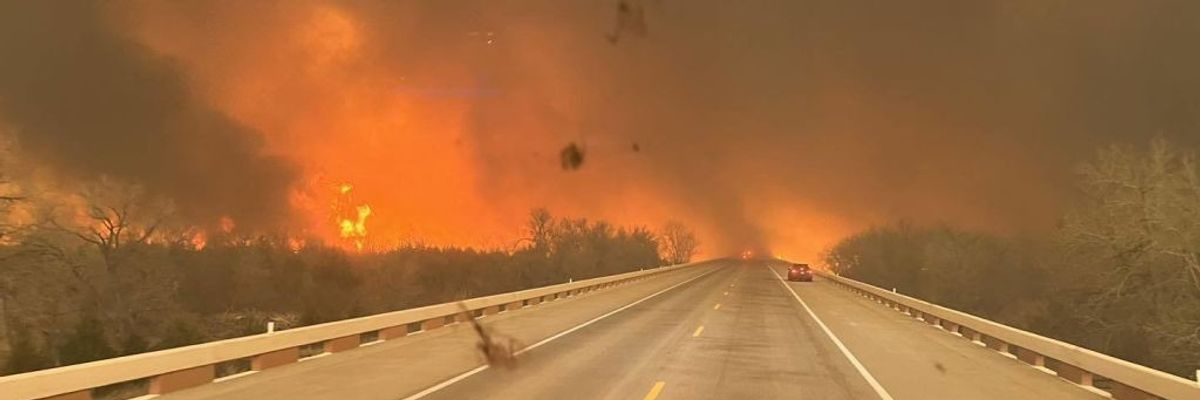"This is what climate change looks like."
That's how University of Michigan climate scientist Jonathan Overpeck responded Thursday to reporting on the Smokehouse Creek Fire—the biggest blaze ever recorded in Texas and the second-largest in U.S. history.
The fire has swiftly spread across 1.1 million acres in the Texas Panhandle, where "lampposts are now melted, power line posts are split in half, and homes and properties have been reduced to charred remains," according toCBS News.
The New York Timesreported that for this fire "to grow so big so quickly, three weather conditions had to align: high temperatures, low relative humidity, and strong winds, said John Nielsen-Gammon, the Texas state climatologist and a professor of atmospheric science at Texas A&M University."
As the newspaper detailed:
Temperatures in Texas have risen by 0.61°F per decade since 1975, according to a 2021 report by the state climatologist's office. The relative humidity in this region has been decreasing as well, Dr. Nielsen-Gammon said. It's less clear whether the winds have changed significantly.
Climate change is likely making fire season start earlier and last longer, he said, by increasing the number of days in a year with hot and dry weather conditions that enable wildfires.
While firefighters continue to battle the Smokehouse Creek Fire and others blazes, climate campaigners and experts are taking aim at the fossil fuel industry for helping create the current crisis in Texas, the nation's leading producer of planet-heating oil and gas.
"Our thoughts are with everyone affected by the massive fires near Amarillo, Texas. We will continue to fight against the fossil fuel emissions that cause these climate disasters," the group Food & Water Watch said on social media.
Ian Duff, head of Greenpeace's Stop, Drilling Start Paying campaign, similarly said that "these fires are an unfolding tragedy. Our hearts go out to those who are experiencing loss across the state."
"The blazes we're seeing in Texas are not just fueled by high winds and exceptionally dry weather," he stressed. "As emissions from burning more oil and gas [make] the climate crisis worse, we can only expect to see more of these out-of-control disasters."
Noting United Nations projections that the number of global wildfires will soar by 50% by the end of this century and "climate change is expected to make these fires more frequent and intense," Duff said that "as the largest oil driller and producer in the United States, oil companies in Texas are literally fueling the flames on their doorstep."
"The corporations threatening our planet and its people—including Chevron, Exxon, Equinor, Eni, BP, Shell, and TotalEnergies—have just announced mindboggling annual profits," he added. "They must stop drilling and start paying. Oil and gas drilling and production from ExxonMobil and other fossil fuel giants [need] to be rapidly phased out—and their billions in profits must pay for the damage they've caused."
Environment Texas executive director Luke Metzger also emphasized that "we have to stop feeding the fire by burning fossil fuels."
"We shouldn't have to worry about wildfires in Texas in February, but climate change has upended any reasonable expectations of when or where these devastating fires might happen," he said. "From the deep freeze of Winter Storm Uri in February 2021 to the spate of fires traversing North Texas this February, the abnormal is the new normal. At best, these climate change-fueled extreme events are major inconveniences. At worst, they're death-causing or life-changing events."
As of Thursday evening, the Smokehouse Creek Fire has killed at least two people and also spread to parts of Oklahoma, according toThe Texas Tribune. The two reported victims are Cindy Owen, a truck driver from Amarillo who was traveling through Hemphill County, and Joyce Blankenship, and 83-year-old from Hutchinson County.
"It's time for Texas to take climate change seriously—and take steps to mitigate its worst effects," Metzger argued. "Foremost, that means weaning ourselves off fossil fuels, transitioning to renewable sources for electric power, and cutting way back on the air pollution that warms the atmosphere and makes Texans sick."
